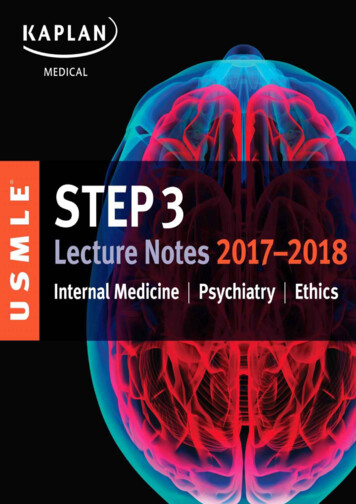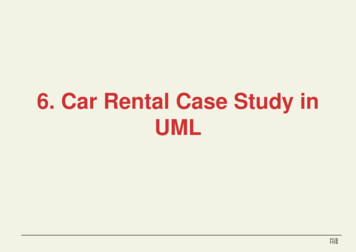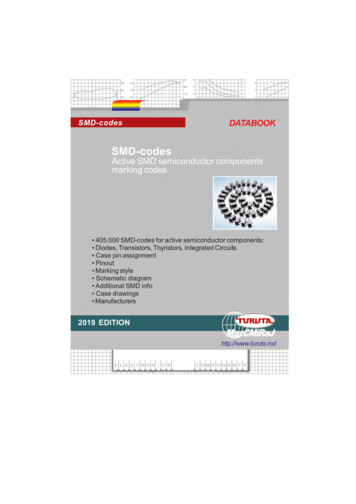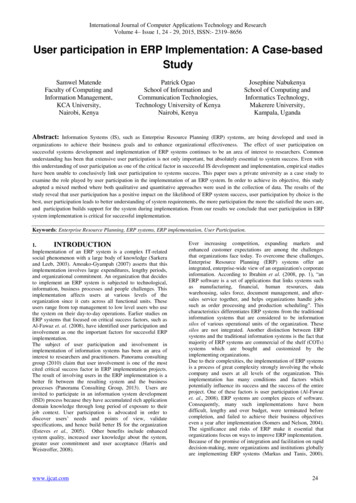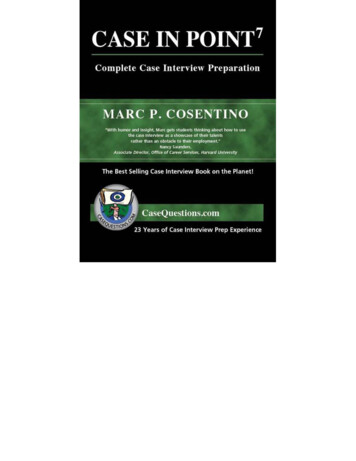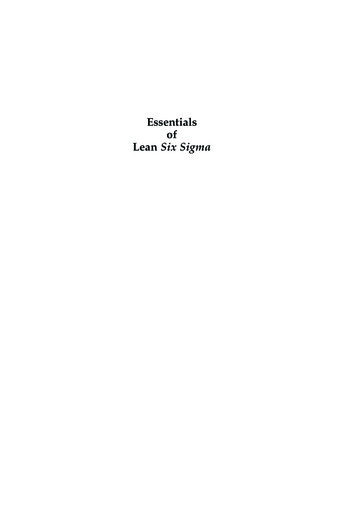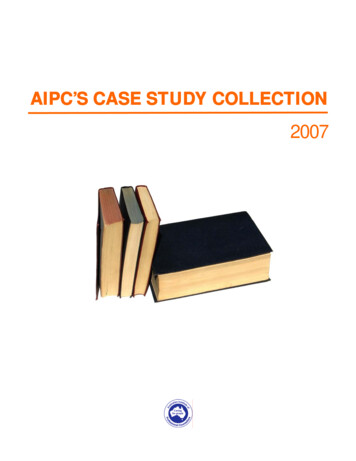
Transcription
AIPC’S CASE STUDY COLLECTION2007
AUSTRALIAN INSTITUTE OF PROFESSIONAL COUNSELLORSAIPC’s Case Study CollectionEdition 1, 2007 Australian Institute of Professional CounsellorsLocked Bag 15 47 Baxter StreetFortitude Valley QLD 4006Phone 61 7 3112 2000 Web www.aipc.net.au
Table of ContentsSection One: Counselling MicroskillsA Case Outlining How to Focus on SolutionsA Case of Using Logical Consequences to Help a Client to Make Difficult Decisions16Section Two: Counselling TherapiesAAAACaseCaseCaseCasefor Gestalt TherapyUsing Behaviour TherapyUsing Rational Emotive Behaviour Therapy (REBT)Demonstrating Person Centred Therapy12182430Section Three: Family CounsellingA Cycle of Dysfunctional Parenting and Unsatisfactory Child DevelopmentBehaviour Modification with ChildrenAn Insight into the SolutionA Case of Domestic Violence37485157Section Four: Grief and Loss CounsellingAAAACase of Grief and LossPerson Centred Approach to Grief and LossCase of Grief Using an Eclectic ApproachCase of Acceptance and Letting Go65707482Section Five: Stress Issues in fofStressful Life ChangeLow Self EsteemMid-Life DifficultiesUsing a Person-Centred and Cognitive-Behavioural Approach to BurnoutSocial AnxietyManagement of Anxiety and StressAcknowledgmentsAbout the InstituteDiploma of Professional CounsellingRecommended ResourcesDownloads899599103108114119120121122122
IntroductionCase Studies are excellent training and professional development resources. Theyprovide an overview of a ‘real life’ situation, merging theoretical knowledge andpractical elements through a structured narrative.Writing a professional Case Study is not a simple task. It not only requires elevatedliteracy and a knack for writing, but also extensive underpinning knowledge andpractical experience. As such, quality Case Studies are not as easily found as otherresources.AIPC has helped in excess of 50,000 students pursue their goal of becoming aprofessional counsellor over the past 15 years. This vast experience has highlightedthe power of Case Studies in assisting contextualize theoretical knowledge. Weacknowledge the value of Case Studies in the mental health profession. Our studentsand graduates have always benefited from the quality content published in ourNational Journal and associated publications – and in a way, we’ve always kept mostof them as a treasure within our knowledge reservoir.But that was until now.To assist and collaborate with practicing and aspiring counsellors, we’ve developedan eBook containing 20 professionally written Case Studies. These cases havebeen hand-picked from dozens of publications and divided into 5 Categories:Counsellor Microskills; Counselling Therapies; Family Counselling; Grief and LossCounselling; and Stress Issues in Counselling.We trust this resource will assist the development of counsellors and mental healthprofessionals throughout Australia, and around the world. We look forward toreceiving feedback from readers: simply email ezine@aipc.net.au with yourcomments, suggestions, additions or anything else that comes to your mind.Enjoy your reading and feel free to forward AIPC’s Case Study Collection 2007 tofamily, friends and colleagues.Kindest Regards,Sandra PolettoChief Executive OfficerAustralian Institute of Professional Counsellors
Section OneCounsellingMicroskills
A I P C ’ SC A S ES T U D Y1C O L L E C T I O NA Case Outlining How to Focus on SolutionsAuthor: Jane BarryMichelle has come to counselling due to increasing feelings of hopelessness about thedirection of her life. She is complaining that she is too "bogged down" in herproblems to see where she should be going. This is Michelle's second session withthe Counsellor. She has spent her previous session discussing the areas of her lifethat she is unhappy with. Within this session, the Counsellor decides to trial asolution-focussed approach with Michelle. The Counsellor hopes to move Michelleonto discussing ways she can overcome the problems that she has described byfocussing more on solutions rather than problem descriptions.For ease of writing, the Professional Counsellor is abbreviated to "C".Essential Case InformationMichelle is twenty-one and has been studying Veterinary Science for the last 3 years.She would like to finish her degree in the next few years, but doesn't think that thiswill ever happen. Currently, Michelle is deferred from her studies and is working twopart-time jobs. She works at the local shopping centre on weekdays and waitressesin the evenings and on most weekends. She dislikes both of her jobs, mostlybecause they involve dealing with the public. Michelle has strong desires to move onwith her career and is frustrated by spending all her time working at tedious jobs.Michelle lives with her partner James, who is also a student. When they were bothstudying full-time, they were having difficulties supporting themselves financially.They made an arrangement where one of them would work to support the other,until their studies were completed. As James is further along in his studies, Michellehas opted to work, and allow him to complete his studies. James will then work tosupport Michelle in her own studies. Michelle had planned to work for about oneyear, however, James has discovered that he will be required to do an extra year ofstudy to qualify for the position he wants.This means that Michelle will have to wait at least two years before she can continueher studies. She is currently feeling very trapped by the arrangement and she doesnot feel positive about her situation over the coming years.1
A I P C ’ SC A S ES T U D YC O L L E C T I O NShe has been reluctant to approach her partner about these feelings, and she can'tsee any way around her predicament.In the previous session, "C" did a Personality Need Type Profile for Michelle. She hasmoderate Type "D" needs, which means that Michelle's studies and career goals arean important means for her to meet her achievement needs. "D" types are notparticularly social, preferring to interact with those who have similar interests tothem. This explained to Michelle why she does not enjoy the public contact involvedin her part-time jobs. Michelle was pleased to find that there were some validreasons for her desires to continue study and for her discontentment with servingthe public. However she was still experiencing difficulty in understanding how thiswould help her to change her circumstances.Session ContentIn this, the second session, "C" asked Michelle if it would be okay to ask her somequestions about her situation; in particular how she thought life would be when shedidn't have these problems. Michelle said she was happy to give it her best shot."C" asked Michelle if there had been any times during the past few months when shefelt happier about the direction of her life. Michelle responded that she had beenfeeling good about her life when she attended a Veterinary seminar a few weeks ago."C" questioned Michelle as to how she had organised this for herself. Michelle repliedthat "one of the girls I waitress with did the shift for me, so that I could attend. I'veoffered to take one of her shifts next week in return.""C" then asked her what it was about the seminar that made her feel better. Michellereplied "it was great to be with people who were interested in the same field asmyself. The presenters inspired me to think about the areas that I would eventuallylike to work in. It was fantastic to meet other people who were practicing in thoseareas and they gave me some good advice. I even made some contacts with Vets inmy state.""C" congratulated Michelle on her decision to attend the seminar, and providingherself with a situation that would gratify her need to pursue her studies. Michelleresponded that the feelings of happiness did not last too long once she had to returnto work. "Dealing with the public is so draining, and many of the people I work withfind the work dull. I don't feel like I have much in common with anyone there."Through the use of a 'Miracle Question', "C" asked Michelle to describe what her lifewould be like if she did not have this problem. "Michelle, imagine that you woke uptomorrow morning and found that your problems had disappeared. What would younotice to be different?""I'd be working, as a Vet, in my own surgery, in my field of speciality. I wouldn'thave to do any more waitressing or serving the public. I'd be working towards myown career." "C" replied, "that sounds like a longer term goal to me, what do youthink might happen in the meantime to move you towards that goal?"2
A I P C ’ SC A S ES T U D YC O L L E C T I O N".I don't know., perhaps I'd have more time to do my studies. I could maybeleave one of my jobs and take on some more subjects. though I'd have to checkthis with James. One of us would still have to do the work, in order for us tosurvive.""C" complemented Michelle on her ideas, "talking with James and renegotiating yourarrangements sounds like a good first step Michelle." "C" went on further to ask howMichelle might approach James about her ideas. Michelle was uncertain about this,and she expressed her concern that James might not feel that she was supportive ofhis career direction by proposing change."C" asked Michelle to think of the times when she demonstrated her commitment toher partner's goals. Michelle responded "there are many times I suppose. I agreed towork initially in order to allow him to finish his studies. I also help him out with hisassignments." "C" asked Michelle how James had responded to her commitment. "Hehas been pretty grateful actually, I don't know why I think that he wouldn't supportmy goals . and I have to consider that the arrangements have changed since wefirst made them.""C" praised Michelle for giving some supportive reasons to negotiate changes forherself. "How would you approach James about your ideas now, Michelle?" Michellewent on to think about how she could approach James about her feelings andnegotiate some changes to occur in their agreement. In particular she thought ofalternative means of financing herself and James, by seeking loans, or reducing theircost of living. In the past, Michelle's parents had assisted her with sorting out herfinances, so she thought to discuss these possibilities with them. She considered thatJames may also have some ideas to contribute.Both "C" and Michelle were feeling positive about the solutions that Michelle haddeveloped for herself. "C" asked Michelle if she could rate how hopeful she felt abouther ability to change her circumstances. Michelle responded that on a scale of 1 to10, she was at about a '6'. "Okay," said "C", what else might have to happen for youto increase that score?" "Well, I'd like to be more focussed on my study at themoment," replied Michelle.As Michelle had already stated this goal, "C" responded with, "you mentioned beforehow happy you felt after attending that seminar. It seemed like such a good strategyfor yourself. I am wondering if you can organise to attend some further seminars?""Yes I can, however, they only happen every now and then. Though several of thestudents were hoping to form a study group and meet on a regular basis. There wereplans to invite some of the local seminar presenters along, to give us some feedbackon our work I guess that I could try to attend some of these.""C" asked Michelle how she might organise this for herself.3
A I P C ’ SC A S ES T U D YC O L L E C T I O N"I could probably change some shifts with the girls that I work with, some of themare pretty keen for more money. I might have to lose a shift every now and then, toget to the study group.""C" affirmed this goal of Michelle's, as a pro-active step towards meeting her needsand maintaining her enthusiasm for her studies. Michelle responded positively to thefeedback and went on further to say that ideally, she would like to be able to beginher practical experience and assessment next year. "C" inquired further into thisarea of her work, and Michelle became more animated as she discussed her plans forher career and future."C" questioned Michelle about the ways in which she could achieve her goal tocommence practical work. At all times, "C" acted as the interested listener, andasked questions to increase his understanding of Michelle's goals, rather thanassuming that he knew what Michelle would want. Michelle was able to determinesome ways in which she might go about starting practical work, whilst still balancingher financial requirements. She also thought more about the agreement that she andJames had made, and ways in which it might be modified.Nearing the end of the session, "C" requested that they take a short break beforesummarising the goals and outcomes for Michelle. "C" prepared some feedback tooffer Michelle in this time.In summary, "C" discussed how Michelle had initially been feeling that her goalswere out of reach. Michelle obviously had dreams and goals that she had wanted topursue, and "C" had noticed how inspired Michelle seemed when she discussed thesein detail. "C" felt that Michelle already had the skills that she needed to solve herproblems, and she had demonstrated this by organising time to attend seminars andstudent work groups. "C" also complemented Michelle's shift in attitude aboutapproaching James with her issues and solutions. "C" validated Michelle's goal toassert her own needs, in a considerate way, with her partner.From Michelle's discussion, it seemed to "C" that her solutions consisted of:Renegotiating an agreement with James where she could reduce her work. Maintainher support of James' goals to finish his study, whilst still meeting her own careergoals.Organise some time off from work to attend study groups or seminars. Look intoother financial arrangements for herself and James, such as student loans, parentalassistance, reducing rent and other expenses. Organise to start Practical placementwith a Veterinary Surgery next year."C" also suggested that Michelle might use some of her contacts from the seminar toassist her with finding placements, and possibly some part-time work.4
A I P C ’ SC A S ES T U D YC O L L E C T I O N"C" mentioned that they had focussed mostly on meeting Michelle's goals for studyand career, rather than other issues such as work. "C" explained to Michelle thatfocussing on a few main issues, was easier than dealing with several issues at once.As Michelle's main goal appeared to be her career, they had focussed on that area."C" suggested that her issues regarding work would likely be reduced, once she wasmeeting her priority needs to study and work in Veterinary Science."C" asked Michelle how she would rate her control over her future, upon reaching theend of the session. Michelle described herself as an 8. She was feeling particularlypositive after revisiting her goals for a career. It had been sometime since she hadthe opportunity to discuss them, and this session had helped her to focus on whatshe could do to change her situation. She reinforced for herself again the benefit ofattending seminars or study groups on a regular basis to keep her enthusiasm goingfor her career goals.End of SessionSome points to consider with Solution-Focussed Counselling: This style ofcounselling, focuses on discussing what the client can do to change their situations,rather than focussing on the problems the clients present with. This does not meanthat problems are ignored, rather that the emphasis is on building solutions.The client will usually be able to describe the who, what, where and why of theirproblems however, the role of the counsellor will be to encourage the client toinquire into the who, what, where and why of their solutions.The counsellor assumes that the client has the skills required to solve their ownproblems and assists the client to do this by: Asking the client about how they have solved problems before Asking the client about exception situations, when the problem was notevident Asking the client about what they did to make the exception situations occur Asking the client how they would like their situation to change for the betterand what it would take for this to occur (the miracle question) Asking the client to prioritise their goals and solve them one at a time5
A I P C ’ SC A S ES T U D Y2C O L L E C T I O NA Case of Using Logical Consequences toHelp a Client Make Difficult DecisionsAuthor: Grahame SmithEssential Case InformationRichard is a 41-year-old plant operator in a heavy machinery company. He workslong hours and must start very early each day. Twelve months ago he accepted atransfer from a country location to a capital city 250 kilometres away from his family.Due to financial obligations this was seen as a necessity. He travelled back to see hisfamily on weekends. He has a wife and 4 children to support.His wife Amy is 38 yrs old, has 4 young children and works 2 days per week as ashop assistant. She now regrets the decision they both made for Richard to work sofar away. The weekends he comes back to her and the children are getting fewer andwhen he does return, all they seem to do is argue. Amy is frightened that hermarriage will fail and is also concerned Richard has found another women (Richardhad an affair 15 yrs earlier soon after they had married). They both decided to comeand see me for marriage counselling.A Personality Need Type Profile was prepared for both Richard and Amy. Richard wasidentified as a Type A (possessing a stronger need for recognition) and Amy Type C(possessing a stronger need for security). Both Richard and Amy were helped tounderstand what their emotional need types were and from where need gratificationwould come. Over time poor communication between them had resulted in themboth not understanding their emotional wants, desires and overall needs. Richardwas a risk taker, while Amy required higher levels of security.This counselling relationship has been in place for six months. One of the key areasidentified by both of them was the lack of trust in their marriage. Clarke 1998 tellsus that "trust tends to relate to a person's perceptions (attributions), valuejudgement, self-esteem and, therefore, to their self-image. For example a client says"I trusted him and he did that to me," a statement of significance, indicating thatvalues once held by the client are no longer valid."6
A I P C ’ SC A S ES T U D YC O L L E C T I O NDuring a number of counselling, sessions Richard denied that he was having an affairand said that his issues with Amy centred on her unwillingness to trust him and herfailure to include him in family decision-making. Amy felt neglected by Richard, thathe had abandoned her, she was concerned he had become very angry, his behaviourhad become erratic and she was fearful he was seeing another woman.Soon after this session, Amy contacted me in a distressed state. She had found outRichard was having an affair and that he had become very ill. She needed to see meurgently. A counselling appointment was organised that afternoon. This was only avery short discussion.Situation - Amy has discovered that Richard is having an affair. He has experiencedan emotional breakdown and is in hospital.Amy was clearly very upset. However, she was able to indicate that she had come tosee me so she could decide what she would do about her marriage.The Counselling SessionC: Last time we met you were concerned about your husband's emotional state andhis erratic behaviour. Can you tell what has happened?Amy: Well to my absolute shock I have found out my husband is having an affairwith another woman. As you know I had some suspicions for some time, but thewoman actually rang me to warn me my husband was having a breakdown. Can youbelieve that! He sat here in this room and lied to both of us so many times! I feel likethrowing him out and divorcing him. But there are the kids to worry about and I stillbelieve I actually love him.C: Amy I hear what you are saying. You must be feeling shocked and betrayed. Andyes his lying to us both is a serious issue.Amy: Yes so much so I can't describe it, I certainly feel confused and not wanted anymore.C: Where is your husband now?Amy: Well this woman was right. He went crazy when I confronted him about it.Threatened to kill himself. In the end I had to call an ambulance. He is in a hospitalat the moment, sedated.C: How terrible for you and your children. How long ago was this?Amy: 2 days ago.7
A I P C ’ SC A S ES T U D YC O L L E C T I O NC: You are doing very well Amy. You have been able to share your feelings in thisroom before in safety so keep going, just take your time. (It's important now that Itake time to validate Amy's feelings and reassure her that this room is a safe placefor her).You mentioned that you wanted to divorce him. Have you considered some of theimpacts on you and your children if you did this? Things like the house, finances, nothaving a partner in your life.Amy: Sort of. It frightens me when I think of being alone, with less money andpossibly no house. But he is so confused at the moment I can't even talk to himabout it and I am so angry with him!C: Amy you have a right to be angry about the lies that have been told to you. (Atthis point I validate her right to be angry about what has happened). Can I ask whatthe doctors say about your husband?Amy: They say once his medication starts to work he will be easier to talk to.C: That must help a little knowing he can be assisted.Amy: Yes, it does. Him being in hospital helps me to cope at the moment.Unfortunately I still love him I think.[In this very difficult situation it is essential that the counsellor does not lose sight ofthe client's goal. Amy wanted help in deciding what to do next with her marriage. Tohelp her achieve her goal, questions were asked of Amy to help her consider thelogical consequences of various courses of action she could take.]C: Amy a few minutes ago I asked you about the possible impacts a divorce couldhave on you and the children. It may be of some value for you to imagine what itwould be like in the future if you stayed with your husband and then what it wouldbe like if you decide to divorce him. Is this OK with you? (it's important in thisemotional situation that the counsellor obtains the client's permission to explorewhat is obviously a painful process).Amy: I'm not really sure about this. My mind is not very clear. But I will give it a try.If I were to stay with him, the girlfriend goes. No more cheating. He has to come andsee you. He will have to sort out his emotional problems. At least the kids wouldhave a father at home. They do like him a lot. He has to move back from the city.We could keep the house and have more money to live on.C: Amy you are doing very well, keep going, how about if you were to decide toleave him.Amy: That would be good pay back. He deserves some pain. But I know the housewould probably be sold along with the boat and other things. There would probably8
A I P C ’ SC A S ES T U D YC O L L E C T I O Nbe a lot less money. I know I would get very lonely. The kids would miss him. That'sall I can think of.C: You have done a great job thinking about what might happen. It must beupsetting to have to do this. So where do you want to go from here?Amy: This has helped you know. I can't imagine what must being going through yourmind considering he pulled the wool over your eyes too! I'm going to wait till hisemotions settle down and I can talk to him. I want some answers from him first. ButI think I want to save my marriage if I can. If this was to happen soon I am not surehow to go about it.[In this statement Amy, is again seeking out how I feel about Richard's abuse of thecounselling relationship. I handle this by giving a short answer and then shift focusback to her new goal.]C: Amy, yes it's true Richard lying to us both greatly disappoints me, but my role isto help you achieve your goals, which may indirectly help Richard.New Goal: Amy wants help to get her husband to see value in their marriage onceagain.Amy: Thinking about all that I have told you today, where to from here? If I decidenot to divorce him, how can I get him to get rid of the girlfriend?[It is also important to note Amy is now seeking specific feedback and advice fromme as the counsellor and to notice that her goal has shifted from her seriouslycontemplating divorce to perhaps saving her marriage.]C: Amy, I can see your distress and I hear just how hard this is for you to decidewhat to do. But that's a fair question to ask. Though without knowing clearly why hedecided to have an affair it is a little hard to be specific. However, just like you and Idid earlier, we examined the possible futures for you depending upon what youdecided to do. You still saw some value in your marriage after thinking this through.It is possible Richard could do the same.You may be able to encourage him to think about the good times you have both hadtogether and the positive life you both have had over the past 10 years. The childrenhe loves are part of this. You may be able to get him to see there are negatives forhim too, if you divorce him or if he was to move out from your home. You could helphim see this. This may also help him to realise that your children and you havegreater value than the girlfriend. I could help with this if you wanted me to. Howdoes that sound to you? Have I got close to the mark?Amy: I think what you said might help.9
A I P C ’ SC A S ES T U D YC O L L E C T I O N[The Counsellor can now provide Amy with information, some instruction andoptions.]Amy: If I was to try and do this alone with my husband, how could I go about it?C: I will not try to kid you that this will be easy, especially if you do not get the sortof answers you may hope for. Are you sure you want to try this alone?Amy: I am not sure yet, but I could get the chance unexpectedly and so I want to beready for it if I can.C: Well, I suggest you and I role-play what could be used to help you to help yourhusband see value in your marriage. We could swap roles. I become you, then youtry it, after me. I could also role-play being your husband and try and give you anumber of different answers to the same questions. This may assist you to preparefor his different reactions. Do you think this would be helpful for you?Amy: I'd like to give it ago, when could we do this?Amy waits for the opportunity to speak to her husband.End of SessionSome points to consider with undertaking Marriage/Relationship Counselling andusing Logical Consequences. Emotions can run very high for clients in such situations and thus clientthinking and decision-making can be deeply impacted upon. Using this processcan help a client to be more logical in their decision-making. In this particular case the client has been given accurate feedback, specificinformation about their situation, some instructions and some clearlyarticulated options still open to her. To remain ethical in this circumstance it needs to be acknowledged that thecounselling relationship with Richard has changed. At some stage his nondisclosure about his affair would need to be confronted. It may mean that Icould no longer be his counsellor and he may have to be referred on toanother relationship counsellor.ReferencesClarke J. (1998). Advanced professional counselling: The fundamentals of human behaviour and the theory andpracticalities of counselling. Brisbane: J&S Garrett.10
Section TwoCounsellingTherapies
A I P C ’ SC A S ES T U D Y3C O L L E C T I O NA Case for Gestalt TherapyAuthor: Jane BarryKomiko is from a second-generation Asian family. She has lived in Australia all herlife, yet her Asian roots are deep. She has been raised according to traditional Asianculture and in addition, she and her family are devout Catholics. Komiko has neverquestioned her upbringing before, yet now at the age of 26 she is struggling withvalue conflicts relating to her religion, culture and sex-role expectations and hascome to counselling in order to allay some of her confusion.A précis of the sessions is as follows. For ease of writing the Professional Counselloris abbreviated to "C".Background InformationKomiko had a strict and formal upbringing with her parents and the various Catholicschools that she attended. She was taught to always honour and respect her elders,such as her parents, teachers and priests. Because of this she explains that she hasnever really felt independent of figures of authority, and has usually acted out therole of a willing child. She states that she seeks the approval of those in authorityand whenever she attempts to assert her own will, she experiences guilt and selfdoubt.She has always followed closely the rules and morals of the Catholic Church, throughher school and adult life. Komiko has never been married, nor has she had a longterm relationship or experienced sexual intimacy. She states that this is primarilybecause of the codes she has learned to live by, however there have been timeswhen she has wanted to break away from these. She is interested in living awayfrom her parents and experiencing a relationship out of wedlock, however she isafraid that if she does so, her parents will not accept her decisions.Although Komiko is frightened to break away from the codes and rules that she haslearned, she is seriously considering their validity and realism. She has noticed achange in her own beliefs about morality, and how she no longer accepts her family'sand church's beliefs without question. She wonders about the importance of her ownindividual conscience, and following her changing beliefs.12
A I P C ’ SC A S ES T U D YC O L L E C T I O NThe questions she asks herself include: What if I am wrong? Who am I to decidewhat is moral or immoral? What will I discover if I follow my own path? Will I lose myself-respect or be able to sur
Section One: Counselling Microskills A Case Outlining How to Focus on Solutions 1 A Case of Using Logical Consequences to Help a Client to Make Difficult Decisions 6 Section Two: Counselling Therapies A Case for Gestalt Therapy 12 A Case Using Behaviour Therapy 18
